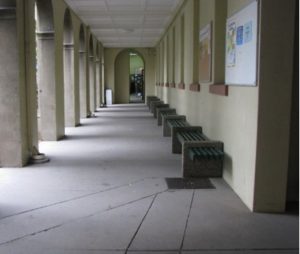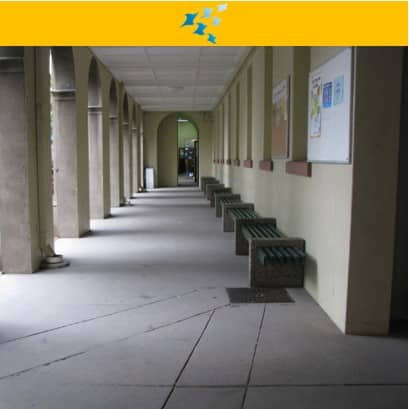Relief can come in the smallest of moments and simplest of gestures. In this edition of the Patient Voice, Darla shares how a brief conversation with an empathetic professor gave her the release and instant relief she had prayed for just moments before.
Darla is a writing tutor and editor who has had ME/CFS for seven years. She is writing a memoir that will educate people about this illness.
If you have a similar story to tell, please share it with us. Learn more about how you can make a submission to the Patient Voice HERE
_____

Darla Nagel
Instant Relief
by Darla Nagel
I came down with a cold during one semester of college, and having even a simple cold on top of ME/CFS is worse than miserable. Viruses deplete my energy even more and take twice as long as normal to go away. By three o’clock on February 9, 2012, I’d already given up on doing any homework, cooking, cleaning, or anything that involved physical or mental effort. My dinner would be a bowl of cereal again. The only reason I went to my classes was out of guilt for the money my parents were withdrawing from their retirement savings to pay for them. Mom and Dad were paying about a third of my educational expenses.
In my English seminar class, we were discussing how students and faculty spend their time. Some students admitted that they didn’t put their full effort into their classes because of their extracurricular activities and jobs. I also didn’t put my full effort into school, but my reason was medical. The thought saddened me. I thought about how money would always be a problem because I wouldn’t be able to work full-time. Plus, I’d have medical expenses to pay.

I prayed, Please give me release. …No, relief. I meant relief. Please give me relief. I’m ready to give up. I don’t know how this is all going to turn out, but it’s going to turn out for my good. Help me. My nose began running, and I sniffed. Please.
“Are you all right?” a man asked.
I hadn’t heard him coming. I lifted my head and saw that it was my professor, a thin man in his thirties with brown hair. His office wasn’t this way, so I was surprised to see him.
“Oh, I’m just really, really tired and wanted to rest,” I answered, straightening my back some and trying to smile.
“Are you not getting enough sleep?” There was his charming British accent.
“Well . . .” I glanced to my left and right and saw no one else around. That gave me the courage to tell him the whole truth.
“I thought it was you, I wasn’t sure. It’s easy to just walk by,” he said quickly.
“I’ll tell you something about myself. I have chronic fatigue syndrome,” I said
“Ah, that’s debilitating,” he replied.
So he believed it was a real illness.
I remembered his comment on a reading response in which I mentioned a doctor calling me crazy: “I know what you mean.” I appreciated that comment at the time, but had never thanked him for it.
“It’s amazing I’m still in school.” My voice wobbled. I couldn’t look attractive with my too-long bangs in my eyes and my loose ponytail, and crying wouldn’t help. I hadn’t had the energy to get a haircut.
“I know.” He meant it. “My brother had it. Ten years.” I hunched again slightly at the thought of spending ten years like this, and he put out his hand in a stop gesture. “Not saying that you’ll have it that long. How long has it been going on?”
“Two and a half.” It sounded far too long to me.
“Two and a half? Are you on any medicines?”
“Yeah, but they don’t work.” I thought of the antibiotic my doctor had put me on.
“That’s hard. And they’re just now considering it a real illness . . .”
He mentioned the couches upstairs, saying they would be more comfortable if I wanted to nap, and I explained that I had to catch the bus soon. He asked about my diet and whether I’d found any sort of support group.
More important, more than once, he said, “If there’s anything I can do for you, let me know.”
Just stopping was the best thing he could have done, showing me he cared. He walked on, saying he was headed to the library to get some coffee at the coffee shop inside. Astounded and relieved, I stared at the door through which he left. Thank you, Jesus! At once, I remembered what I’d prayed for and realized that I’d experienced an instant yes response to prayer. Then I cried; these tears were more of gratitude than out of pain. And for that I remain truly thankful.

 Lucinda Bateman, MD, is a renowned clinician, researcher, and educator. Her Johns Hopkins University Medical School training instilled an approach to care that she has employed throughout her career - the patient comes first and the unknown or unexplained does not equate to a lack of proper and compassionate care. Since starting her own practice in 2000, she has served on six boards or committees, been the principal investigator for 45 studies, authored/coauthored 40 journal articles, served as adjunct instructor and adjunct assistant professor in the University of Utah Departments of Preventative Medicine, Internal Medicine, and Anesthesiology, and lectured around the world.
Lucinda Bateman, MD, is a renowned clinician, researcher, and educator. Her Johns Hopkins University Medical School training instilled an approach to care that she has employed throughout her career - the patient comes first and the unknown or unexplained does not equate to a lack of proper and compassionate care. Since starting her own practice in 2000, she has served on six boards or committees, been the principal investigator for 45 studies, authored/coauthored 40 journal articles, served as adjunct instructor and adjunct assistant professor in the University of Utah Departments of Preventative Medicine, Internal Medicine, and Anesthesiology, and lectured around the world.